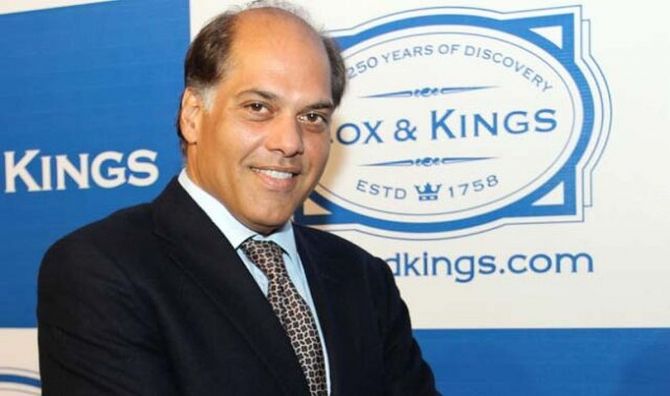Was Cox & Kings' Group Chief Executive Officer Ajay Ajit “Peter” Kerkar duped by his employees, as he claims, or did a cocktail of greed, poor cost control and bad management bring the travel firm down, wonder Pavan Lall and Aneesh Phadnis.

Two years ago, in September, as Cox & Kings celebrated its 260th anniversary, Group chief executive officer Ajay Ajit “Peter” Kerkar shared anecdotes of the firm’s journey and its growth plans with an audience that included consuls and corporate heads.
Wine flowed freely and a women’s band played at the event held at a Mumbai five-star hotel.
The party, however, didn’t last long.
A year later, the company went bust, leaving customers in the lurch and employees without jobs.
And on November 26, Kerkar was arrested by the Enforcement Directorate (ED) on charges of money laundering and diverting the Rs 3,642 crore his group companies had taken in loans from Yes Bank and other banks.
Kerkar has denied the charges.
So was Kerkar, 56, duped by his employees, as he claims, or did a cocktail of greed, poor cost control and bad management bring the travel firm down?
The Kerkar family, headed by Ajit Baburao Kerkar (Peter Kerkar’s father), acquired Cox & Kings in 1981, buying 60 per cent of the shares.
Kerkar, an anthropology and economics graduate from Stanford University, California, joined the firm in 1986 at its London office as a 20-something.
Colleagues describe him as ambitious and intelligent, with a hands-off style of functioning — a man who saw himself more as a dealmaker than manager, as a former associate recalls.
While Kerkar oversaw the company’s European businesses, his older sister, Urrshila, micromanaged affairs in India as director.
Their turfs were well-defined and the brother-sister duo would not step on each other’s toes.
Kerkar would visit India barely three or four times a year for board meetings, mostly running the affairs through his chief financial officer and confidant Anil Khandelwal, who was also arrested in the same case last month.
Such was their rapport that even his sister could not question Khandelwal, says an associate. As CFO, he controlled the finances of other sister companies.
Employees of Ezeego, the Kerkar family-owned B2B travel company, told the ED that Khandelwal controlled their company’s finances and their loan documents, too, were signed by Cox & Kings employees.
High school friends, who spoke on condition of anonymity, say he was generous with treats on his birthday at the Taj Hotel in Mumbai.
His father, who had helped build the Taj Group of Hotels (now IHCL), was the boss there before he left the Tata Group in 1997 amidst a bitter dispute with its new chairman, Ratan Tata.
Cox & Kings’ legacy — it was set up in 1758 — and the association with the Taj Group helped Kerkar scale up the business and expand to new geographies — the UK and Australia.
“The firm also made a foray into visa processing service,” says a travel industry analyst.
“While rival tour operators also considered entering the visa business, Cox & Kings launched the service in 2008.
"It is after its IPO in 2009 that the ambitions got sky high.”
In 2011, Cox & Kings made its biggest bet when it bought UK-based travel company Holidaybreak for around Rs 2,300 crore.
But due to changed business conditions and high debt, it began selling business units in Europe.
This included the sale of its education tour for Rs 4,367 crore in October 2018.
While the stated aim of the deal was debt reduction, an inquiry ordered by lenders found that sale proceeds were not used to pay bank loans and were instead allegedly siphoned off by the company’s promoters.
A forensic audit carried out by PwC on behalf of lenders uncovered many other malpractices such as doctoring of financial accounts, fictitious transactions and creation of layers of subsidiaries to siphon off money.
The Central Bureau of Investigation and the Mumbai Police, too, are probing charges of fraud on complaints filed by banks.
“Intra-corporate funding is common and we had no reason to suspect a fraud.
"When we left the company last year, we believed that it had collapsed due to mismanagement and overleveraging.
"Questions should also be raised about the role of banks and their compliance system.
"On what basis did they grant all these loans to the company?” a former Cox & Kings employee asks.
Born to a Maharashtrian father and Swiss mother, Kerkar schooled at Campion School, a Christian public institute in Fort in southwest Mumbai, before going to Stanford.
His early years were, as far as those who know him remember, above board.
In due course, he married Emma Tully, the daughter of BBC journalist Mark Tully, in a low-key affair at the Taj Hotel, Mumbai.
There were no celebrities, CEOs or politicians at the wedding and the fare served was Marathi and Konkani — relatively simple stuff for a man in a family with careers steeped in hospitality and fine dining.
One hospitality executive recalls meeting Kerkar at the Centaur Hotel in Juhu — a six-acre strip of land abutting the beach and boasting enviable views.
The Juhu Centaur, which later became Tulip Star, had its own troubles.
Estimated to be worth thousands of crores, its ownership was mired in dispute.
Tulip Star Hotel was acquired by Kerkar’s hotelier father and the Tulip Group from Air India’s subsidiary, Hotel Corporation of India, during the privatisation exercise undertaken by the National Democratic Alliance government in 2002.
However, a CBI inquiry following allegations of corruption in the sale complicated its rebuilding.
The structure still stands and is now called V Hotel — semi-complete and running as a wedding facility for hire.
The executive remembers that in the presence of his father, Kerkar remained largely silent.
The son was always low key.
Neither a flashy dresser nor one for fancy cars, luxury watches or overt spending.
During his visits to India, he would spend much time at the Belvedere Club at the Oberoi Hotel in Nariman Point, or was seen playing golf at the Willingdon Club or Chembur in Mumbai.
In London, Hampstead Golf Club was his haunt.
He has homes in West Hampstead (London), Mumbai and Kerry (Ireland).
A travel and tourism competitor, who met Kerkar at corporate events, says, “He seemed to have many irons in the fire, and it was hard to tell how these businesses were all doing.”
Kerkar’s ventures included budget hotels in Europe.
According to reports, he would speak of his home in Kerry Island in the West Coast of Ireland and a love for dogs, cooking and collecting artworks, but top art galleries in Mumbai say they never did business with him and he was hardly ever in touch with them when in India.
One travel agent, who worked with him, says, “A factor of mismanagement and greed went hand in hand, and that has led to where he is now.”
Tourism, he adds, is like pharmacy — “full of different verticals, and the fundamental mistake happens when you spend too much money on vanity projects, and I think that’s what happened.”
Another former employee says Kerkar, who had inherited the business from his father, behaved like an investor, not a promoter.
“Customer and employee complaints had been piling up for a few years, but nothing was done about them.”
Today, Kerkar is in custody and all that is left of one of the world’s oldest travel companies is the story of a journey that ended badly.
Photograph: PTI Photo










